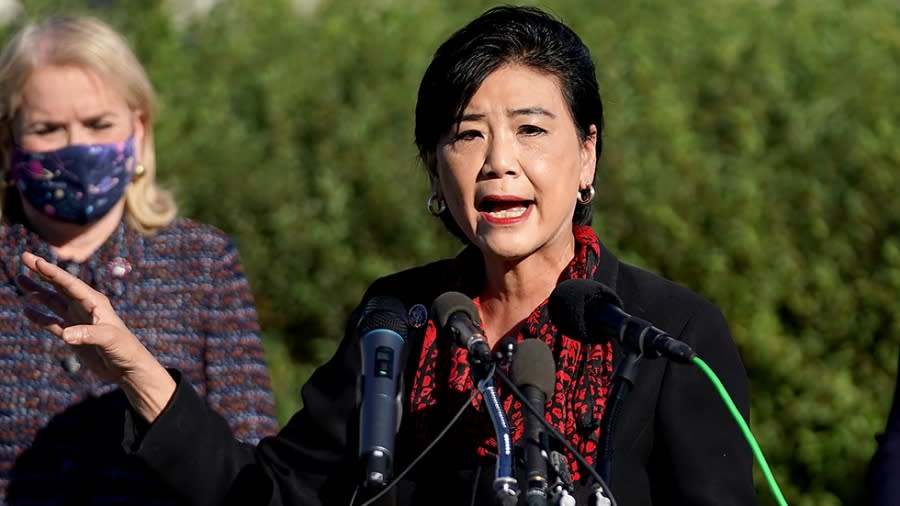These House members broke from their parties on rail strike legislation
A handful of Democrats and Republicans bucked their parties in votes Wednesday on resolutions to avert a rail strike and provide workers with seven days of paid sick leave.
The first measure, which would institute an agreement to avoid a rail worker walkout next month, passed in a 290-137 vote. It was the same tentative agreement that the two largest rail unions, with the help of the Biden administration, negotiated in September.
Eight Democrats crossed party lines and voted against the bill, and 79 Republicans supported it.
Democratic “no” votes included Reps. Judy Chu (Calif.), Mark DeSaulnier (Calif.), Jared Golden (Maine), Donald Norcross (N.J.), Mary Peltola (Alaska), Mark Pocan (Wis.), Rashida Tlaib (Mich.) and Norma Torres (Calif.).
While House Republican leadership did not formally whip votes for the measure, the majority of the conference — 129 members — voted against the bill. Votes in support came from more moderate GOP lawmakers, like Reps. Anthony Gonzalez (Ohio), Chris Jacobs (N.Y.) and Fred Upton (Mich.).
The chamber also passed a separate resolution on Wednesday that would allocate seven days of paid sick leave to rail workers per year, responding to the main qualm many workers had with the tentative agreement. Union leaders requested 15 days of paid sick leave, but the tentative agreement presented them with only one more personal day.
House members approved the second resolution in a 221-207 vote, with three Republicans crossing the aisle to vote “yes” with all Democrats present. GOP Reps. Don Bacon (Neb.), Brian Fitzpatrick (Pa.) and John Katko (N.Y.) supported the measure.
Part of the Democratic opposition to the first resolution stemmed from the agreement’s lack of paid sick leave. Chu said she could not support the measure unless the resolution allocating seven days of paid sick days were included.
“While the tentative agreement reached in September includes many increased benefits for these rail workers, it includes only one additional personal day for those working around the clock for our nation’s railroads,” Chu said in a statement. “I challenge anyone who has ever woken up with the flu, or been infected with COVID, or had to stay home to care for a sick child, to argue that paid time off is not essential.”

Rep. Judy Chu. (Greg Nash)
Peltola, who won a special election over the summer and her first full term this month, told NBC News in an interview on Tuesday, “I just don’t think it’s right or fair to expect workers to go to work sick as a dog without being able to have a few days to recover.”
Tlaib sounded a similar note.
“Every worker in America deserves paid sick leave. Rail workers are essential employees and worked hard through a global pandemic without a single paid sick day—this is unconscionable,” she said in a statement on Wednesday.
The Michigan Democrat also noted that four unions had rejected the tentative agreement included in the first resolution.
“If the rail industry wants to avert a national rail strike, then they should provide their employees with guaranteed paid sick leave. As for the Democratic party, if we are going to be the party of the working class, we need to stand with workers every time,” she said.
Other Democrats who voted “no” were opposed to Congress intervening in the rail union’s contract negotiations.
“We should be supporting their fight, and I do not believe that Congress should be dictating the results of a union contract negotiations process,” Torres said in a statement, which also pointed out the lack of paid sick days. “I am aware of, and deeply troubled by, the impact that a national rail strike would have, but I cannot in good conscience undermine our working men and women who are simply seeking dignity and respect.”

Rep. Norma Torres. (Anna Moneymaker)
“My position is that the government should not be interfering in union negotiations and contracts,” Pocan told The Hill in a statement. “It is a very slippery slope. Workers deserve the ability to use everything in their means to get benefits like sick time.”
Norcross, the co-founder of the Congressional Labor Caucus, pointed to both those issues: a lack of paid sick leave and getting involved with union negotiations.
“I believe that this is not the time to remove the collective bargaining rights of America’s rail workers. Negotiations should continue!” Norcross wrote on Twitter Tuesday.
“There were two bills before us today: one with paid sick leave and one without it. Hardworking railroaders worked all during the pandemic and I believe they are deserving of paid sick leave,” he told The Hill in a statement on Wednesday.
Golden told The Hill that by rushing the bill through the House, “Congress undermines the fundamental bargaining power of workers and unions across the country.”
“The right to bargain for fair wages and humane working conditions is a bright red line for me,” he added.
On the second resolution, Bacon said he voted to provide rail workers with seven days of paid sick leave per year “because ‘quality of life’ is just as important as a pay raise.”
“I think it’s fair that rail workers be offered the opportunity to address the health needs of themselves and their families as they arise. The House of Representatives offers sick and vacation time to all of its employees, and I believe our railroad workers deserve the same,” he added.
Updated: 7:21 p.m.
For the latest news, weather, sports, and streaming video, head to The Hill.

